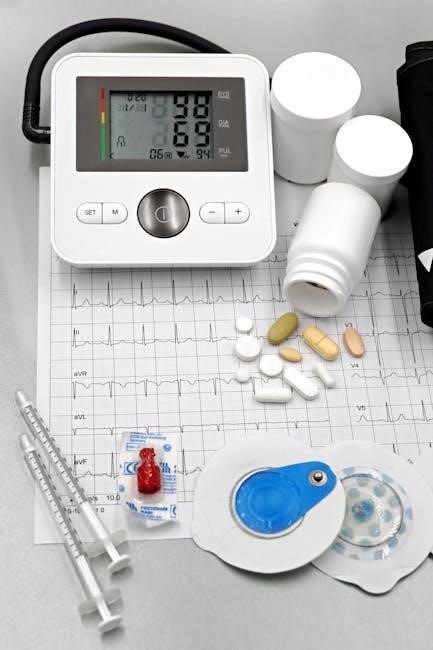joint commission medication management standards 2023 pdf
- by stefanie

The Joint Commission’s 2023 Medication Management Standards aim to enhance patient safety by improving medication practices, reducing errors, and ensuring compliance with updated regulations and evidence-based guidelines.
1.1 Overview of the Joint Commission and Its Role in Medication Management
The Joint Commission is a nonprofit organization that sets standards for healthcare quality and safety. Its Medication Management (MM) standards ensure safe and effective medication use, minimizing risks and improving patient outcomes. These standards are part of a comprehensive framework to enhance healthcare quality and compliance.
1.2 Importance of Medication Management in Patient Safety
Effective medication management is critical for preventing errors, adverse events, and readmissions. It ensures patients receive the right medications, dosages, and administration methods, improving outcomes and safety. Proper management minimizes risks, enhancing trust in healthcare systems and aligning with the Joint Commission’s goals for safe, high-quality care.
1.3 Key Updates in the 2023 Standards
The 2023 standards introduce expanded medication selection criteria to address specific patient populations. They also include revised antibiotic stewardship requirements with 12 elements of performance and updated guidelines for medication compounding. These updates aim to enhance patient safety, reduce errors, and align with current best practices in medication therapy.

Key Components of the 2023 Medication Management Standards
The standards emphasize National Patient Safety Goals, Elements of Performance, and Antibiotic Stewardship, ensuring safe medication practices, reducing errors, and promoting compliance with updated guidelines.
2.1 National Patient Safety Goals (NPSGs) Related to Medication Management
The National Patient Safety Goals (NPSGs) focus on improving medication safety by addressing risks like medication errors, label misreading, and adverse drug events. They emphasize accurate documentation, proper labeling, and monitoring of high-alert medications to minimize harm and ensure safe care.
2.2 Elements of Performance (EPs) for Medication Management
Elements of Performance (EPs) are specific requirements within the Joint Commission standards. They include proper medication labeling, accurate documentation, and processes to reduce errors. EPs like MM.09.01.01 outline 12 elements focusing on antibiotic stewardship and safe medication practices to ensure compliance and improve patient outcomes.
2.3 Antibiotic Stewardship Requirements
Effective January 1, 2023, the Joint Commission introduced new antibiotic stewardship requirements under Standard MM.09.01.01. These include 12 elements of performance (EPs) aimed at optimizing antibiotic use, reducing resistance, and improving patient outcomes. The requirements emphasize evidence-based practices and monitoring to ensure safe and effective antibiotic therapy.

Safe Management of High-Alert and Hazardous Medications
The Joint Commission’s 2023 standards emphasize safe handling of high-alert and hazardous medications to minimize risks. This includes proper identification, storage, and administration protocols to ensure patient and staff safety.
3.1 Definition and Identification of High-Alert Medications
High-alert medications are drugs with a heightened risk of causing harm if improperly used. The Joint Commission defines them as medications requiring special attention due to their potential for serious adverse effects. Identification focuses on their risk of harm, dosing complexity, and potential for errors, ensuring safer handling and administration practices.
3.2 Strategies for Safe Handling and Administration
The Joint Commission emphasizes standardized protocols for high-alert medications, including double-checking processes, barcode scanning, and limited access storage. Training staff on proper handling and administration, along with regular audits, ensures compliance and minimizes risks, promoting a culture of safety and accountability in healthcare settings.
3.3 Role of Technology in Reducing Errors
Technology plays a pivotal role in minimizing medication errors through Electronic Health Records (EHRs), Barcode Medication Administration (BCMA) systems, and automated dispensing cabinets. These tools enhance accuracy by verifying doses, tracking administration, and alerting staff to potential errors, ensuring safer and more efficient medication management processes across healthcare settings.

Updates and Revisions in the 2023 Standards
The 2023 standards introduce revised requirements for antibiotic stewardship and medication compounding, along with expanded criteria for medication selection, aiming to enhance patient safety and compliance with modern healthcare practices.
4.1 New Requirements for Medication Compounding
Effective January 1, 2024, the Joint Commission revised requirements for medication compounding in hospitals and critical access hospitals. These updates aim to minimize risks associated with compounded medications, ensuring quality, safety, and compliance with best practices. The standards emphasize proper preparation, storage, and labeling to prevent errors and improve patient outcomes.
4.2 Expanded Criteria for Medication Selection
The 2023 standards introduce expanded criteria for medication selection, focusing on patient-specific factors and evidence-based practices. This includes tailored therapies for vulnerable populations, such as pediatrics and geriatrics, ensuring medications are safe, effective, and align with National Patient Safety Goals (NPSGs). These updates promote personalized care and reduce adverse events.
4.3 Changes in Staffing and Emergency Management Plans
The 2023 standards require healthcare organizations to revise staffing plans for emergencies, ensuring adequate personnel management during crises. Updates also include enhanced emergency preparedness measures, aligning with patient safety goals and regulatory expectations to improve response effectiveness and minimize risks during critical situations.

Compliance Strategies for Healthcare Organizations
Healthcare organizations must develop robust policies, conduct regular staff training, and implement auditing processes to ensure adherence to the 2023 medication management standards and improve patient safety outcomes effectively.
5.1 Developing Policies and Procedures for Medication Management
Organizations must create comprehensive policies and procedures for medication management, aligning with 2023 Joint Commission standards. These documents should address high-alert medications, antibiotic stewardship, and medication compounding, ensuring clear guidelines for safe practices and compliance with regulatory requirements to minimize risks and improve patient care outcomes effectively.

5.2 Training and Education for Healthcare Staff
Healthcare staff must receive regular training on medication management practices, including high-alert medications and antibiotic stewardship. Education should cover Electronic Health Records (EHRs) and Barcode Medication Administration (BCMA) systems. Ongoing competency assessments and interdisciplinary collaboration ensure staff are prepared to implement safe and effective medication practices, aligning with 2023 Joint Commission standards and improving patient safety.
5.3 Auditing and Monitoring Compliance
Regular audits and monitoring are essential to ensure adherence to medication management standards. Organizations must review Elements of Performance (EPs) and National Patient Safety Goals (NPSGs). Continuous oversight helps identify gaps, improve processes, and maintain compliance with 2023 Joint Commission standards, ultimately enhancing patient safety and care quality.

Special Considerations for Specific Populations
The 2023 Joint Commission standards emphasize tailored medication management for pediatric, geriatric, and vulnerable populations. Special attention is given to dosing, monitoring, and addressing chronic conditions to ensure safe and effective care.
6.1 Medication Management for Pediatric and Geriatric Patients
The 2023 Joint Commission standards highlight the importance of age-specific medication management for pediatric and geriatric patients. This includes accurate dosing, careful monitoring for adverse effects, and tailored treatment plans to address unique physiological needs and comorbidities, ensuring safe and effective medication use across these vulnerable populations. Geriatric patients often require simplified regimens to prevent polypharmacy, while pediatric patients need precise weight-based dosing. Healthcare providers must consider these factors to minimize risks and optimize therapeutic outcomes, adhering to updated guidelines and best practices outlined in the 2023 standards to enhance patient safety and quality of care.
6.2 Managing Medications for Patients with Chronic Conditions
Effective medication management for patients with chronic conditions requires comprehensive, individualized care. The 2023 Joint Commission standards emphasize the need for coordinated treatment plans, regular monitoring of therapy adherence, and timely adjustments to manage disease progression. Healthcare providers must also address potential drug interactions, polypharmacy risks, and patient education to ensure safe and effective long-term medication use, improving overall health outcomes and quality of life for these patients. Adherence to these standards helps in minimizing complications and enhancing patient safety, aligning with the Joint Commission’s focus on evidence-based practices and continuous improvement in care delivery.
6.3 Addressing Medication Discrepancies in Vulnerable Populations
The 2023 Joint Commission standards highlight the importance of identifying and resolving medication discrepancies in vulnerable populations, such as pediatric, geriatric, and chronically ill patients. Tailored approaches, including enhanced monitoring and patient-specific care plans, are essential to minimize risks and ensure safe, effective medication use, promoting better health outcomes for these groups.

The Role of Technology in Medication Management
Technology plays a critical role in enhancing medication management, improving patient safety, and streamlining processes. Tools like Electronic Health Records (EHRs), Barcode Medication Administration (BCMA), and automated systems ensure accurate medication administration and reduce errors, fostering efficient and reliable care delivery.
7.1 Use of Electronic Health Records (EHRs)
EHRs are integral to modern medication management, enabling accurate documentation, real-time tracking, and improved decision-making. They facilitate compliance with Joint Commission standards, enhance patient safety, and streamline communication among healthcare providers, ensuring seamless integration of medication orders, administration records, and clinical guidelines.
7.2 Barcode Medication Administration (BCMA) Systems
BCMA systems enhance medication safety by verifying the “five rights” using barcode scanning. They reduce errors, improve accuracy, and ensure compliance with Joint Commission standards. Integration with EHRs streamlines documentation, while real-time alerts prevent adverse events, making BCMA a critical tool in modern medication management and patient safety strategies.
7.3 Automated Dispensing Cabinets and Pharmacy Systems
Automated dispensing cabinets (ADCs) and advanced pharmacy systems optimize medication storage, dispensing, and tracking. They minimize human error, ensure secure access, and maintain accurate inventory. Integration with EHRs and BCMA systems supports seamless medication management, improving efficiency and adherence to Joint Commission standards while enhancing patient care quality.

Managing Medication Errors and Adverse Events
Medication errors and adverse events require prompt reporting, thorough investigation, and implementation of corrective actions. Organizations must analyze root causes, share findings, and apply preventive strategies to improve safety.
8.1 Reporting and Investigating Medication Errors
The Joint Commission’s 2023 standards mandate the reporting and thorough investigation of all medication errors. Organizations must conduct detailed root cause analyses, implement corrective actions, and share findings to prevent future errors, ensuring continuous improvement in patient safety and compliance with regulatory requirements.
8.2 Implementing Corrective Actions and Preventive Measures
Organizations must develop and implement corrective actions and preventive measures following medication errors. This includes identifying root causes, modifying workflows, and monitoring effectiveness. The Joint Commission emphasizes sustained improvements to ensure patient safety and compliance with medication management standards, promoting a culture of continuous quality enhancement.
8.3 Learning from Medication-Related Adverse Events
Leveraging insights from medication-related adverse events is crucial for improving patient safety. The Joint Commission advocates for thorough root cause analysis, transparent communication with patients and families, and sharing findings with staff. This fosters a culture of accountability and continuous improvement, ensuring lessons learned are translated into actionable safety measures and policy updates.

Staff Education and Competency in Medication Management
Ensuring staff competency in medication management is vital for patient safety. The Joint Commission emphasizes ongoing training, competency assessments, and interdisciplinary collaboration to maintain high standards of care and reduce errors effectively.
9.1 Ongoing Training Requirements for Healthcare Staff
Ongoing training is essential for healthcare staff to stay updated on medication practices. The Joint Commission mandates regular education on medication safety, error reduction, and compliance with standards. Annual training on high-alert medications and antibiotic stewardship is required, ensuring staff are proficient in safe medication administration and adherence to updated protocols.
9.2 Competency Assessment in Medication Administration
Competency assessment ensures healthcare staff demonstrate proficiency in medication administration. The Joint Commission requires organizations to validate staff skills through observations, simulations, and periodic evaluations. This ensures accurate medication administration, reduces errors, and maintains patient safety, aligning with updated standards and evidence-based practices.
9.3 Interdisciplinary Collaboration in Medication Safety
Interdisciplinary collaboration is crucial for ensuring medication safety. The Joint Commission emphasizes teamwork among pharmacists, nurses, and physicians to enhance communication and reduce errors. Regular care conferences and shared decision-making tools promote coordinated care, improving patient outcomes and aligning with the 2023 standards for safer medication practices.
The 2023 Joint Commission Medication Management Standards provide a robust framework to reduce errors and enhance patient safety. Future updates will focus on advancing safety practices and fostering continuous improvement in medication therapy.
10.1 Summary of Key Takeaways from the 2023 Standards
The 2023 Joint Commission Medication Management Standards emphasize patient safety, error reduction, and compliance with updated guidelines. Key updates include enhanced antibiotic stewardship, improved medication selection criteria, and the integration of technology like EHRs and BCMA systems to ensure safe medication practices and regulatory compliance.
10.2 Preparing for Future Updates and Enhancements
Healthcare organizations should stay proactive by monitoring Joint Commission updates and participating in educational programs. Regular internal assessments and investments in technology will help adapt to evolving standards, ensuring compliance and continuous improvement in medication management practices.
10.3 The Role of Continuous Quality Improvement in Medication Management
Continuous quality improvement (CQI) is essential for sustaining high standards in medication management. By analyzing data, identifying gaps, and implementing evidence-based practices, healthcare organizations can enhance patient safety, reduce errors, and maintain compliance with evolving Joint Commission standards.
Related posts:
Get the latest Joint Commission medication management standards for 2023. Download your free PDF guide now!
Posted in PDF